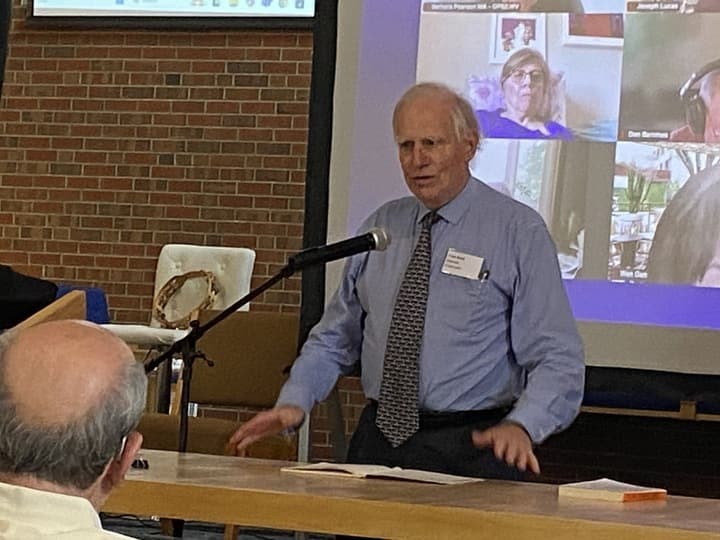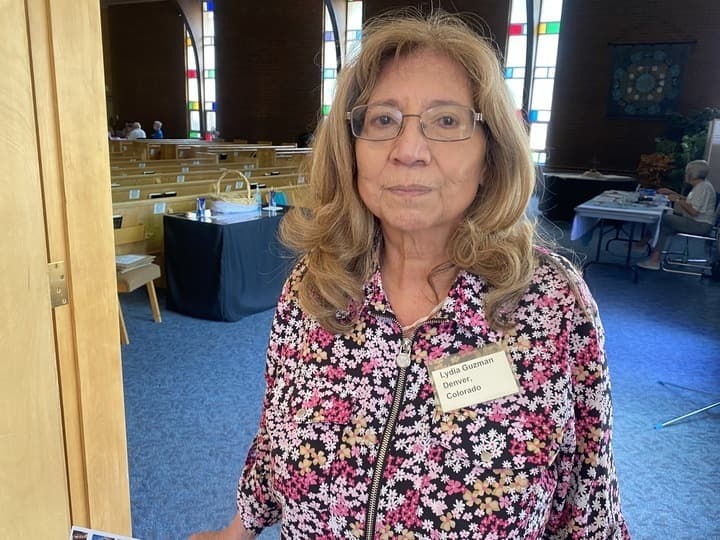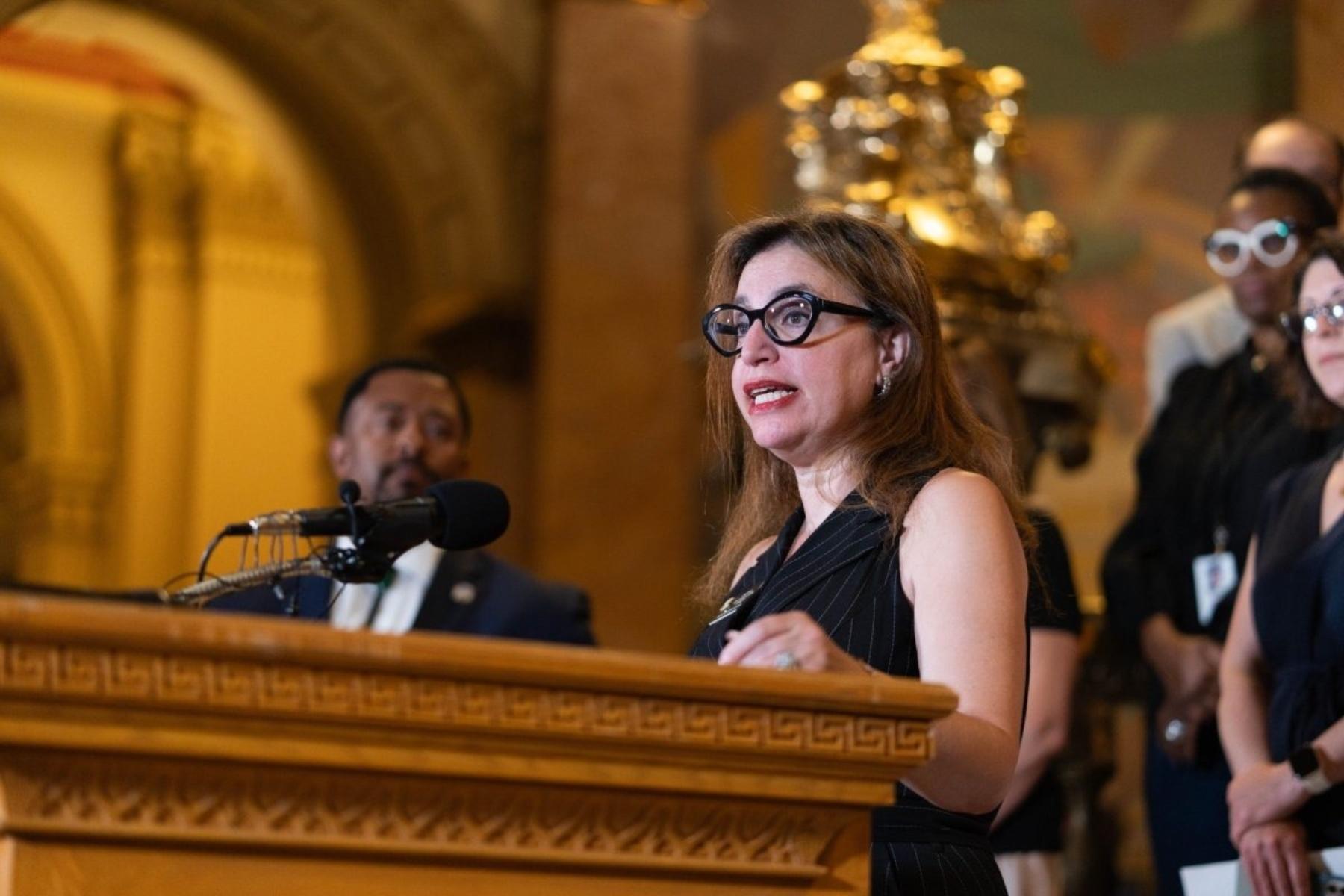
A couple dozen people gathered in The Kirk of Bonnie Brae church last Friday in Denver, with another couple dozen online from around the country. Their ambitious task: to fundamentally reform health care.
The group behind it is called One Payer States, which has been coordinating state-based single payer efforts since 2010.. Their mission, according to its website, is to win high-quality, cost-effective health care for all, by finding state, regional and national solutions.
The elevator pitch is simple, said one of the organizers, retired journalist T.R. Reid.
“The United States ought to provide health care for everybody. We're never going to get it done on a national basis because Congress is owned by the insurance companies and Big Pharma,” he said.
The way to get it done, Reid believes, is by winning ballot measures in multiple states, all in the same election – to remake the health care system.
“So state by state, state plans to provide health insurance for everybody is the way we're finally going to get America to where it should have been long ago. Health care for all,” said Reid, who worked for the Washington Post, was a contributor for NPR, and wrote a best-selling book called The Healing of America.
Reid helped lead a similar ballot push in Colorado in 2016, Amendment 69, to create a single-payer system.
That measure would have created a first of its kind in the nation single-payer plan. It would have covered all residents through a state insurance program that would compete with private insurance. Through that program, consumers would no longer have paid premiums or deductibles.
The high-profile proposal got trounced at the polls, by a 4 to 1 margin. Reid believes that was at least partly because they were outspent by opponents, including health care and insurance companies, 10 to 1.
“So here's the new strategy. Ten states put a ballot initiative on the ballot the same election day some November,” said Reid. “Dissipates the insurance companies money. They'll spend their money in Illinois and Florida and New York, and then Colorado, Oregon and Washington can slip by unnoticed and pass it.”
Like women's suffrage, child labor laws and legalized marijuana, Reid said, once one or two states do it, others will follow.
“We should do this because we can save lives,” said Lydia Guzman, a retired educator, is president of Health Care for All Colorado. “Every day people are dying, people are getting bankrupt. A one payer system would pool all our money together, like a Medicare for all system in our state.”
Here’s how it would work, backers said. You would now be able to buy health insurance from a state agency that would cover everybody up to age 65. Seniors would stay on Medicare. Everybody in the state would be covered and there would be no more medical bankruptcy. You could still buy from United Health or Aetna if you wanted to, but supporters say traditional health plans would be more expensive than that of a new state health program.
“Their administrative costs run to 18, 20 percent. State-run plans are about 5 percent,” Reid said.

The last time around, opponents of the proposed ColoradoCare plan sharply criticized it as too expensive. An economic analysis at the time found it could save the state billions of dollars in administrative costs and profits as private insurers get replaced. The study also raised questions about financial sustainability.
Guzman said what's different now is the deep federal cuts to popular health programs.
“People are just 'what can we do? They're cutting our Medicaid.' And Medicare is probably in danger next,” Guzman said. “People are getting thrown off their Medicaid and Social Security's in jeopardy. We have to do something.”
The tax and spending law the Republican majority in Congress passed last month includes new bureaucratic hurdles for millions of Americans who are enrolled in Medicaid.
For the first time, low-income adults in most states will have to begin meeting work requirements to hang on to their health coverage. Most of the changes won’t happen until after the 2026 mid-term elections.
Meanwhile, Reid’s argument about the power of health-related industries in Washington D.C. is backed up by federal data on spending on lobbying, compiled by the nonprofit Open Secrets. This year, the pharmaceutical industry is first, spending nearly $227 million. Insurance companies have spent $90 million and hospitals have spent almost $77 million. All three industries rank in the top five.
Skepticism from the insurance industry, hospitals
Long before any campaign gets started, the one-payer idea is drawing criticism from Colorado groups representing insurers and hospitals.
“Colorado voters made their position clear in recent years when they overwhelmingly rejected a single-payer proposal—and the concerns that drove that decision remain front and center today,” said Kevin McFatridge, Executive Director, Colorado Association of Health Plans, which represents insurers. “A state-by-state approach to universal coverage may sound appealing, but it risks fragmenting care, creating uncertainty for patients, and duplicating costly federal efforts. Rather than revisiting expensive, government-run models, Colorado should focus on building on the progress we’ve already made through more targeted, sustainable reforms.”
The group representing Colorado hospitals and health systems said it strongly supports efforts to ensure all Coloradans have access to affordable, high-quality health coverage and that it has worked with policymakers to expand and strengthen coverage options statewide.
“However, we do not support a single payer model that would concentrate control over health care financing and delivery into one government-run system. A multi-payer system provides greater choice, fosters innovation, and better supports the diverse needs of Colorado patients and communities,” said Cara Welch, senior communications director with the Colorado Hospital Association.
"I appreciate the bold thinking and share the goal of universal coverage, but a state-by-state approach to single-payer health care is not practical or feasible. It's also not politically realistic,” said Cody Belzley, a longtime Colorado health policy advocate who worked on the 2016 no campaign.
After passage of the federal budget bill, thousands of Coloradans will lose coverage, she said, a crisis that will have ripple impacts through all aspects of the health care system. “We need to be focused on charting a realistic, actionable path forward to protecting care for our neighbors and supporting the health care providers that serve our communities," she said.
In 2016, the ColoradoCare proposal raised more than $800,000, with a lot of support from thousands of small donors from around Colorado and the county.
A coalition of business groups backed the no side, vastly outspending proponents. Big national players, like Kaiser Permanente, United Health Care, HealthOne, Pharma and Cigna donated heavily. Locally the ballot measure faced opposition from the Denver Metro Chamber of Commerce, Colorado Association of Realtors, Associated General Contractors and oil and gas groups.
The Chamber of Commerce said it still opposes the idea.
"The Denver Metro Chamber continues to advocate for policies that support healthy communities and strengthen Colorado’s business climate. While our current health care system has challenges, a single-payer model would make things worse, not better,” said J. J. Ament, President and CEO of the Denver Metro Chamber of Commerce, in an emailed statement.
Looking ahead: A study in Colorado, signature gathering
About one in 20 Coloradans, around 265,000 people, lacked health insurance in 2023, according to the Colorado Health Institute.
The state’s uninsured rate dropped dramatically with the introduction of the Affordable Care Act, Obamacare, and the expansion of Medicaid, more than a decade ago. That drove the uninsured rate from nearly 16 percent in 2011 to below 5 percent in 2023.
But that rate is expected to rise with the passage of the federal budget bill, which slashed spending on health care programs like Medicaid, subsidies for people to buy insurance and the federal food assistance program SNAP.

Guzman said polling she’s seen in Colorado and nationally suggest people want universal health care.
Colorado lawmakers passed, and Gov. Jared Polis signed, a new law this past legislative session to examine the idea. It tasks the Colorado School of Public Health with analyzing “draft model legislation for implementing a single-payer, nonprofit, publicly financed, and privately delivered universal health-care payment system for Colorado that directly compensates providers.”
Guzman said due to the state’s huge budget hole and looming budget cuts, $750,000 will need to be raised to fund it.
She said she hopes the study “shows that we have that support and get the support from the legislators, and we hope there's support to put it on the ballot in 2028,” the year of the next presidential election in 2028.
To get it on the ballot, they'll need to gather signatures for a petition in each state they target.









